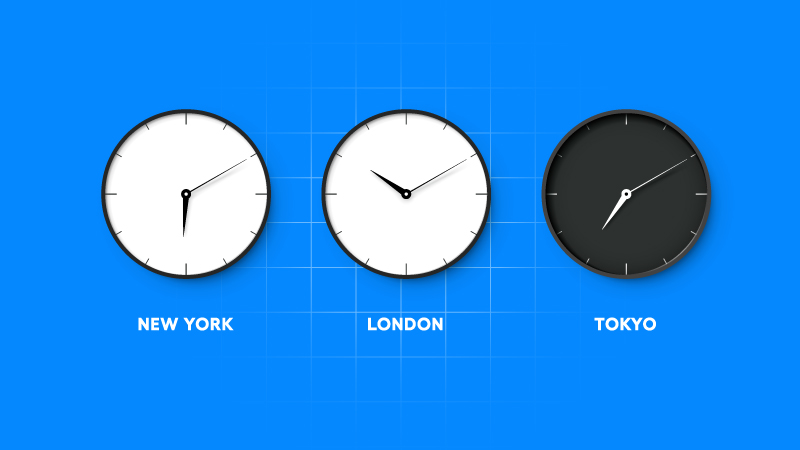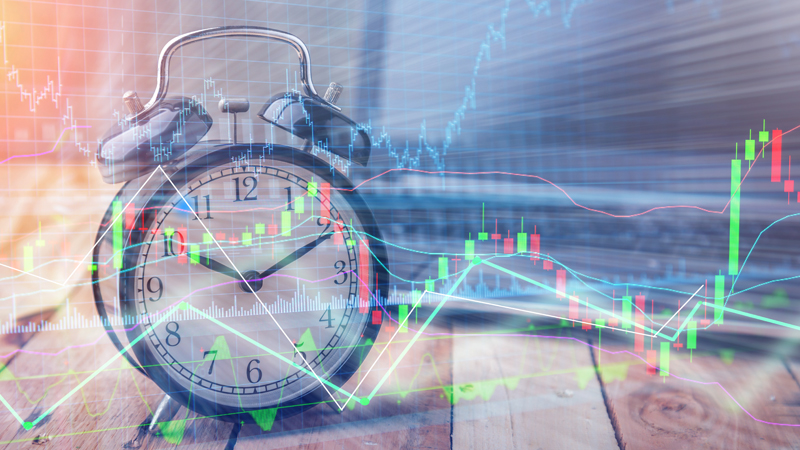How do you know the best times to trade Forex? Are there even ideal hours to do it?
To help you answer these questions, here is a brief guide on what you need to know about trading hours in the Forex market.
Peak hours

This almost constantly-running market has peak hours, and it has everything to do with the global nature of Forex trading. To explain this, we’ll need to mention the major forex trading sessions:
- Sydney/Tokyo (11 p.m. and 8 a.m. GMT)
- London (7 a.m. to 4 p.m. GMT)
- New York (12 p.m. to 8 p.m. GMT)
These account for almost 75% of all total Forex trades in the world, with the remaining 25% occurring during off-peak hours. Most Forex traders in the world are located in areas within these time zones, with their working hours roughly corresponding to the hours listed above.
So while you can trade outside these hours (as long as it's not on a weekend), expect fewer traders who are open for business. The general rule is that you want to trade when most people are trading.
Forex market overlaps

If you take a closer look at the times earlier mentioned, you’ll notice overlaps of a few hours among the three major trading markets in the world. Again, this has something to do with the different time zones among traders.
These overlaps of Forex trading sessions are special. Since they usually have the highest number of traders online, they experience a higher level of volatility. High volatility is where most of the profit lies in forex trading since the major shifts in prices are larger than they are during hours when they don’t overlap. Larger movement means more opportunities for traders to sell at higher prices or buy currencies at lower rates.
Here are the overlap hours you may want to look out for:
- London – New York: (12 p.m. to 4 p.m. GMT)
- Tokyo – London (7 a.m. to 8 a.m. GMT)
The best time to trade in Forex

The general consensus is that the London – New York overlap (12 p.m. to 4 p.m. GMT) is the best time to trade Forex since you have plenty of time to get trades done before the markets close or open for the day. These two areas also contain the most amount of businesses, traders and brokers, so any shift that occurs between them will surely impact rates for the rest of the day. And since most major pips will happen in this overlap, it’s also easier for traders to keep an eye on potential trends and movements in the market. It’s a good time to update your trading strategies since plenty of traders will do the same.
Risk vs. Reward

Always keep in mind that trading at peak hours doesn’t come without risks. Since the market moves so fast during these times, there’s also an equal chance for you to lose a lot of profit. You need to be careful with the trades you make during peak hours, because the market can, and will, sometimes change from being in your favour to against you real quickly.
For Forex traders that are looking to minimise risk, it’s a good idea to stay away from peak trading hours and conduct your business during the less busy hours of the major trading sessions. The possibility for profit may be less, but the losses you can incur also shrink.
Alternatively, you can choose to invest in a currency pair that isn’t too reliant on major movement during these overlaps. You’ll notice that the major trading hours usually deal with USD, EUR and JPN (with AUD being close in terms of value), so you may want to deal with other currencies that largely move because of commodity changes, like the Swiss Franc (CHF) and the Canadian dollar (CAD).
At the end of the day, the best time to trade will ultimately fall on your unique trading style and experience with the Forex market. While there are certain times and guidelines that you can follow, there’s nothing stopping you from being more flexible with how you trade and ultimately gain profit.
Start trading with Blueberry. for as low as $100 when you open a live account. We offer very low spreads and lightning-fast trade executions, so you can take advantage of winning opportunities.
Disclaimer: All material published on our website is intended for informational purposes only and should not be considered personal advice or recommendation. As margin FX/CFDs are highly leveraged products, your gains and losses are magnified, and you could lose substantially more than your initial deposit. Investing in margin FX/CFDs does not give you any entitlements or rights to the underlying assets (e.g. the right to receive dividend payments). CFDs carry a high risk of investment loss.




